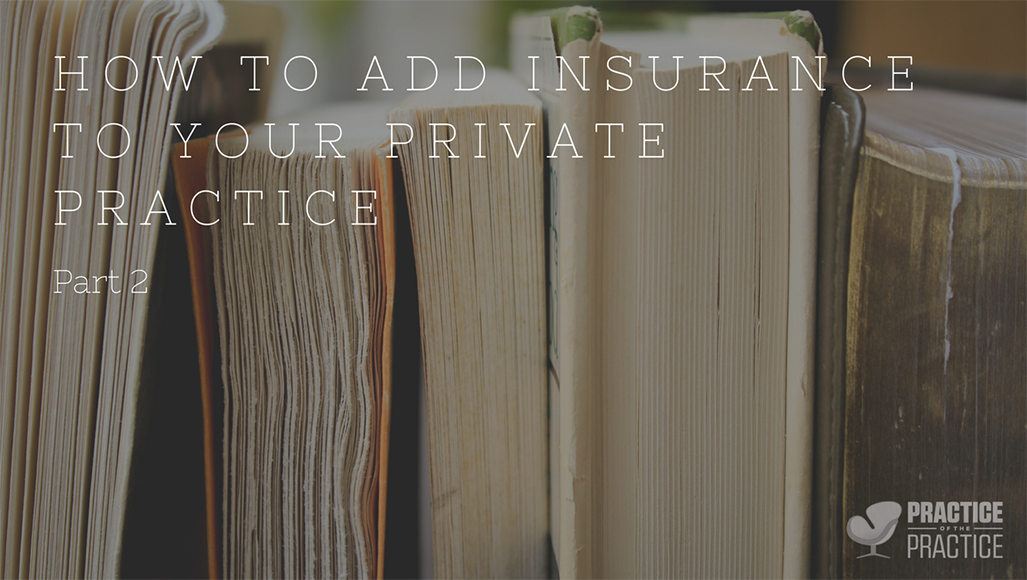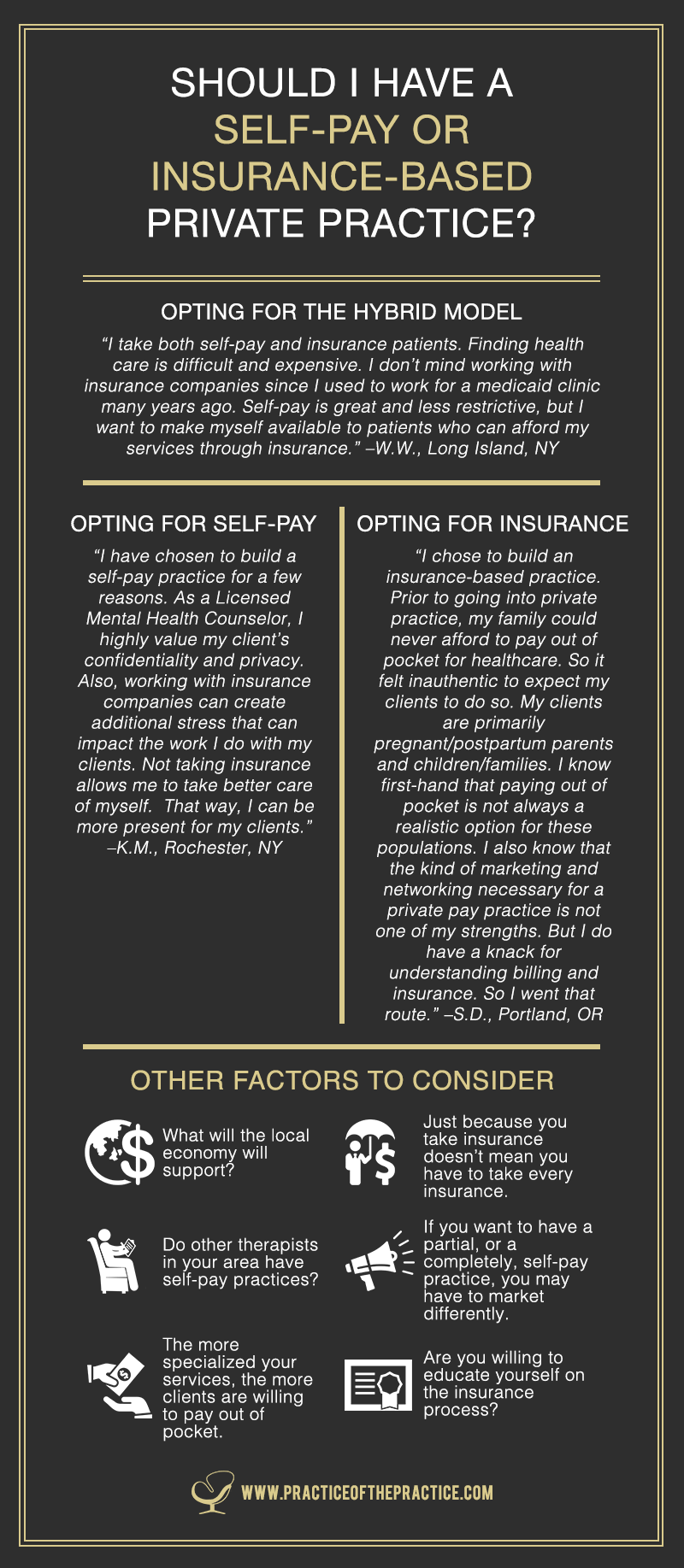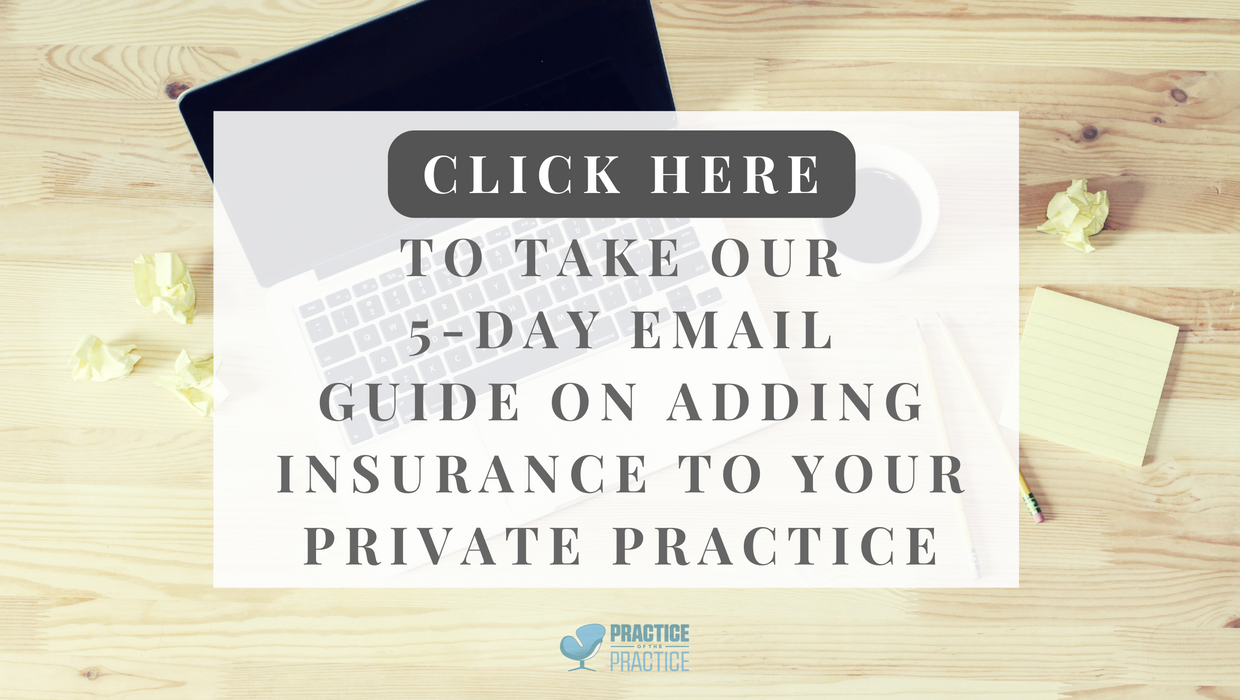I recently posed this question to a Facebook group full of therapists in private practice: How did you decide to either take insurance or have a self-pay practice? The amount of responses I got was overwhelming! Therapists are passionate about this subject and I got a thought-provoking array of responses.
Opting For Self-Pay
Some therapists reported being firmly in the self-pay camp. Here are some of their comments:
“Self-pay only here. I have one pro bono slot, a few very low fee slots, a counseling student rate, and my full fee. About half my practice is supervision & consultation; some of my supe slots are a very low fee (I contract with a university), and my off-site supervision fee is half of my full therapy fee. It’s my way of giving back. I am also able to help more people than I could of if I were just seeing clients. I also have political issues with supporting the insurance industry; if we switch to single payer, I will consider taking insurance.” — R.B., Oakland, CA
“As a Registered Mental Health Intern, I am not allowed to be on insurance panels. Not wanting to wait until I am licensed, I provide services on a private-pay self-pay model under the supervision of a licensed professional. This is a win-win situation for the client and for me as a therapist. They can have the added confidentiality of not having a diagnosis on a medical insurance, still use the fess on their taxes and I am able to do what I love while waiting for full licensing.” — D.R., Melbourne, FL.
“I have chosen to build a self-pay practice for a few reasons. As a Licensed Mental Health Counselor, I highly value my client’s confidentiality and privacy. Also, working with insurance companies can create additional stress that can impact the work I do with my clients. Not taking insurance allows me to take better care of myself. That way, I can be more present for my clients.” –K.M., Rochester, NY
“I’m self-pay and I make more money with half the drama.” –A.C., Montgomery, AL
Opting For Insurance
Other therapists reported being strongly pro-insurance. Here are some of their responses:
“I chose to build an insurance-based practice. Prior to going into private practice, my family could never afford to pay out of pocket for healthcare. So it felt inauthentic to expect my clients to do so. My clients are primarily pregnant/postpartum parents and children/families. I know first-hand that paying out of pocket is not always a realistic option for these populations. I also know that the kind of marketing and networking necessary for a private pay practice is not one of my strengths. But I do have a knack for understanding billing and insurance. So I went that route.” –S.D., Portland, OR
“I’m a social worker, and my basic values and passions lie in helping people in need and providing easier access to mental health care. Many people have difficulty accessing mental health care if they must self-pay. So I decided to take insurance to keep close to my roots as a social worker. I do take self-pay clients, of course, but insurance opens up doors for potential clients and increases my caseload. It also increases their chances of receiving the mental health care they need.” – B.F., Cleveland, OH
“We are a pro-insurance group practice and have been since we opened in 2005. I too am a social worker that values accessibility. I know that accepting insurance means we get to have a bigger impact on the people that need our services the most. Whenever I hear the gratitude of a mother that has been trying to find someone that will work with her policy, I know we made the right choice. I also think working with insurance can be a business savvy approach. It has opened doors for partnerships and contracts that would not be available if we weren’t able to leverage third party reimbursements. Pro-insurance, business savvy. Make money and make a difference!” —S.S., Towson, MD.
“My practice is 99% insurance based. I chose to take insurance to appeal to my ideal clients, working professional adults and couples in their 20s-40s. In my experience, people who have insurance from their employers and pay for their premiums (or pay for insurance entirely themselves – like most of us do being self-employed!) are more inclined to want to see a clinician that is INN with their insurance, as that is the most affordable. I feel there is a great deal of stigma associated with therapy. That it is for the ‘wealthy’ and not affordable. I accept insurance to help combat that stigma. If you use your insurance benefits, it IS affordable and accessible. I also feel that by being INN, clients already know I went through a credentialing process and therefore there is a bit more buy-in and trust right away. I didn’t just hang up a shingle, I went through a very thorough credentialing process. The ability to fill my practice within three months, a constant stream of referrals (what is a slow season??) and having to do minimal marketing doesn’t hurt either. Many clinicians shy away from insurance due to fear or lack of knowledge. I hope I can help other clinicians increase their knowledge of insurance credentialing and billing so that they can make an informed decision that is best for them and their practice.” —D.N.K., Chicago, IL
Click here for a step-by-step guide on out how to fill in an insurance claims form.
Opting For the Hybrid Model
Other therapists advocated for the model of the “hybrid”. A part self-pay practice while also being credentialed with some insurance panels. Here are their comments:
“My practice is a mix of both insurance-based and self-paying clients. I choose to accept insurance because I work with breast cancer patients and I understand that amidst all the medical bills coming through, it’d be difficult to have an additional out-of-pocket expense. For other clients, being able to use their insurance benefit has also been important to them.” –A.P., Redmond, WA.
“I don’t see it as a binary option, but rather as a continuum from all self-pay to all insurance. Both have advantages and disadvantages. I have chosen not to be involved with every insurance company as I don’t want to be involved in keeping track of their differences and processes. On the other hand, some of the people I want to serve would not be able to get service if they were not able to use the insurance they had already paid for. So I am selective and strategic about which insurance panels I am on and that places me in the middle of this spectrum.” —C.S., New York, NY, Bronx, NY and Goshen, IN
“I take both self-pay and insurance patients. Finding health care is difficult and expensive. I don’t mind working with insurance companies since I used to work for a medicaid clinic many years ago. Self-pay is great and less restrictive, but I want to make myself available to patients who can afford my services through insurance.” –W.W., Long Island, NY
Other Factors To Consider When Making This Decision
There were many more facets to this issue than I had originally thought when I posed the question. Some other factors to think about when making the decision about what type of payment to accept in your practice are:
- What do you think the local economy will support? If you live in a rural, economically depressed area, for example, having a self-pay practice only may not be possible.
- Do other therapists in your area have self-pay practices? If so, that’s a good sign that there is a population of people there who will support it.
- The more specialized your services are, the more clients are willing to pay out of pocket for it. For example, if you are the only EFT-trained couples therapist in your area, folks may be willing to forego using their insurance since they can’t get that service anywhere else nearby.
- Just because you take insurance doesn’t mean you have to take every insurance. Talk to other therapists in your area to find out which insurance companies offer good reimbursement rates and pay quickly. If you are starting out, it may be better to stick to those and then, if you need to, get credentialed with other panels.
- If you want to have a partial self-pay practice or a completely self-pay practice, realize you may have to market differently to this population. Or spend more time marketing than you would to folks who want to use their insurance. Is this something you want to spend time/money doing?
- Learning to take insurance can be a steep learning curve but, as the pro-insurance therapists noted, there are many good reasons for having an insurance-based practice. Are you willing to educate yourself on the process in the beginning?
I hope this article gave you some practical information to help you decide whether you want a self-pay, insurance based or hybrid private practice.



